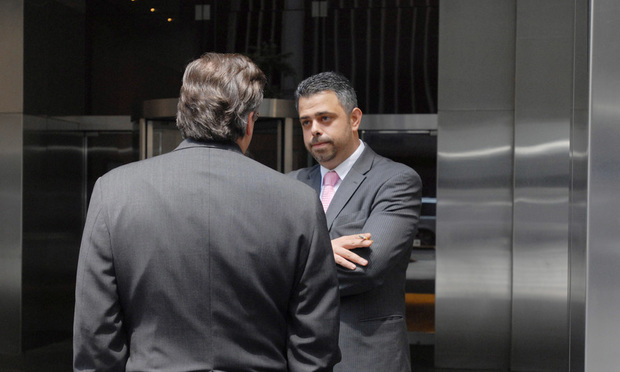After Tearful Apology, Star Dewey & LeBoeuf Witness Avoids Jail
After two trials in a prosecution that originally included 11 defendants, no one is going to jail in the Dewey & LeBoeuf case.
October 27, 2017 at 01:10 PM
5 minute read
 Former Dewey & LeBoeuf finance director Francis Canellas outside the firm's Manhattan offices in May 2012.
Former Dewey & LeBoeuf finance director Francis Canellas outside the firm's Manhattan offices in May 2012. A Manhattan judge on Friday imposed no jail time on Francis Canellas, Dewey & LeBoeuf's former finance director who pleaded guilty in a cooperation agreement with prosecutors and became the star witness in the years-long criminal case over Dewey's 2012 collapse.
With Canellas' sentencing, it's all but certain that no one will go to jail in the Dewey case, which included more than 100 charges and 11 criminal defendants when it was first brought in 2014.
Manhattan Supreme Court Justice Michael Obus on Friday imposed 250 hours of community service on Canellas, who pleaded guilty to first-degree scheme to defraud after being accused of taking part in a scheme to dupe creditors about Dewey's true financial condition.
Canellas, repeatedly pausing and fighting back tears during the sentencing hearing, said, “What I'd like to do is apologize, apologize to the financial institutions who depended on the accuracy of Dewey & LeBoeuf's financial statements and have suffered.” He said he also apologizes to Dewey's finance team. “They depended on me,” he said, adding he was embarrassed.
Obus, after hearing Canellas, noted that the posture of the case had changed considerably since Canellas first entered his plea in 2014, citing most recently the non-prison sentence of Joel Sanders, the only Dewey executive who was convicted.
Obus said he took into account the fact that Canellas “accepted responsibility” and cooperated with prosecutors “in what turned out to be a very extended proceeding.” He added that incarceration “will serve no purpose whatsoever.”
The maximum sentence for the charge Canellas pleaded to is one-and-a-third to four years. The Manhattan District Attorney's Office had recommended one to three years of jail time for Canellas, but in light of Sanders avoiding a prison sentence, prosecutors said in a written letter filed in court this week that “proportionality among co-defendants is a factor to be considered in sentencing.”
“At the time the plea and cooperation agreements were negotiated, the People did not anticipate that a promised recommendation would entail a harsher sentence than that received by a defendant convicted after trial,” wrote assistant district attorney Peirce Moser, referring to Sanders.
'Worst Decision of His Life'
Canellas was the top cooperator for the DA's Office in the case against Dewey's three executives, among a team of seven former Dewey employees in the firm's accounting department who wound up testifying at two trials. By end of the trials, Canellas had spent three-and-a-half years cooperating with the prosecution, meeting with them nearly 30 times.
Four other cooperators who pleaded guilty and who testified at trial have also received no jail terms. Dianne Cascino, Ilya Alter and David Rodriguez were sentenced to community service and Lourdes Rodriguez was sentenced to unconditional discharge without community service.
Two other cooperators await sentencing, and it's likely the top penalty either could face, if any, is community service.
Two Dewey defendants who fought their charges, including former chairman Steven Davis and former junior manager Zachary Warren, received deferred prosecution agreements, while former executive director Stephen DiCarmine was acquitted at a second trial. Sanders, the former CFO, was convicted on three counts but only sentenced to community service and ordered to pay a $1 million fine earlier this month.
“The landscape has changed considerably since Mr. Canellas” pleaded guilty, said his attorney, Caren Decter, counsel at Frankfurt Kurnit Klein & Selz, during his sentencing hearing Friday.
Obus imposed no monetary fine on Canellas, citing his circumstances. His lawyers said Canellas could no longer find work in the financial sector and has been living paycheck to paycheck.
In a letter to the judge, his fiancee, Lourdes Rodriguez—one of the seven cooperators and former billing director at Dewey—explained that she watched Canellas “trade in his suit for jeans and construction boots” to take up home repair, watching self-help videos to learn from other contractors.
Janis Meyer, Dewey's former general counsel and now a partner at Hinshaw & Culbertson, submitted a letter to the judge saying Canellas was an integral part of the effort to wind the firm down and she found him “conscientious, concerned about the fate of our administrative employees—and our former partners—and willing to work hard to get the job done.”
In explaining his conduct, Canellas' attorneys said in submissions to the judge, “Frank lost his moral compass and joined his superiors on a misguided path to save the firm.”
“Frank now realizes that he made the worst decision of his life by not leaving the firm in late 2008. He stayed at Dewey out of a misguided sense of duty and obligation to the only firm he had ever worked for, to the hundreds of Dewey employees and their families, and to his bosses—especially Mr. Sanders—who gave him tremendous responsibility at a young age,” his attorneys said.
As part of his community service, Canellas told Obus he will be a mentor for an organization, The Fortune Society, that helps individuals transition from prison and promotes alternatives to incarceration.
Canellas' cooperation agreement became controversial. He had initially pleaded to second-degree grand larceny but was allowed to withdraw his plea after the mistrial of Dewey executives and the dismissal of their grand larceny counts.
In an unusual arrangement, prosecutors quietly amended their cooperation agreement with Canellas to allow him to re-plead to a lesser charge, first-degree scheme to defraud, before a second trial. This allowed Canellas, their top witness, to escape a larceny charge no longer facing the executives. The arrangement attracted aggressive criticism from the executives' defense attorneys, who said it further damaged his credibility on the witness stand.
This content has been archived. It is available through our partners, LexisNexis® and Bloomberg Law.
To view this content, please continue to their sites.
Not a Lexis Subscriber?
Subscribe Now
Not a Bloomberg Law Subscriber?
Subscribe Now
NOT FOR REPRINT
© 2025 ALM Global, LLC, All Rights Reserved. Request academic re-use from www.copyright.com. All other uses, submit a request to [email protected]. For more information visit Asset & Logo Licensing.
You Might Like
View All
Long Island Midsize Firm and Managing Partner Sued for Sexual Harassment, Discrimination
6 minute read
King & Spalding Adds Veteran Antitrust Litigator From White & Case in New York
3 minute read

Troutman Pepper Accused of Inattentive Case Management in $59M Malpractice Suit
7 minute readTrending Stories
Who Got The Work
J. Brugh Lower of Gibbons has entered an appearance for industrial equipment supplier Devco Corporation in a pending trademark infringement lawsuit. The suit, accusing the defendant of selling knock-off Graco products, was filed Dec. 18 in New Jersey District Court by Rivkin Radler on behalf of Graco Inc. and Graco Minnesota. The case, assigned to U.S. District Judge Zahid N. Quraishi, is 3:24-cv-11294, Graco Inc. et al v. Devco Corporation.
Who Got The Work
Rebecca Maller-Stein and Kent A. Yalowitz of Arnold & Porter Kaye Scholer have entered their appearances for Hanaco Venture Capital and its executives, Lior Prosor and David Frankel, in a pending securities lawsuit. The action, filed on Dec. 24 in New York Southern District Court by Zell, Aron & Co. on behalf of Goldeneye Advisors, accuses the defendants of negligently and fraudulently managing the plaintiff's $1 million investment. The case, assigned to U.S. District Judge Vernon S. Broderick, is 1:24-cv-09918, Goldeneye Advisors, LLC v. Hanaco Venture Capital, Ltd. et al.
Who Got The Work
Attorneys from A&O Shearman has stepped in as defense counsel for Toronto-Dominion Bank and other defendants in a pending securities class action. The suit, filed Dec. 11 in New York Southern District Court by Bleichmar Fonti & Auld, accuses the defendants of concealing the bank's 'pervasive' deficiencies in regards to its compliance with the Bank Secrecy Act and the quality of its anti-money laundering controls. The case, assigned to U.S. District Judge Arun Subramanian, is 1:24-cv-09445, Gonzalez v. The Toronto-Dominion Bank et al.
Who Got The Work
Crown Castle International, a Pennsylvania company providing shared communications infrastructure, has turned to Luke D. Wolf of Gordon Rees Scully Mansukhani to fend off a pending breach-of-contract lawsuit. The court action, filed Nov. 25 in Michigan Eastern District Court by Hooper Hathaway PC on behalf of The Town Residences LLC, accuses Crown Castle of failing to transfer approximately $30,000 in utility payments from T-Mobile in breach of a roof-top lease and assignment agreement. The case, assigned to U.S. District Judge Susan K. Declercq, is 2:24-cv-13131, The Town Residences LLC v. T-Mobile US, Inc. et al.
Who Got The Work
Wilfred P. Coronato and Daniel M. Schwartz of McCarter & English have stepped in as defense counsel to Electrolux Home Products Inc. in a pending product liability lawsuit. The court action, filed Nov. 26 in New York Eastern District Court by Poulos Lopiccolo PC and Nagel Rice LLP on behalf of David Stern, alleges that the defendant's refrigerators’ drawers and shelving repeatedly break and fall apart within months after purchase. The case, assigned to U.S. District Judge Joan M. Azrack, is 2:24-cv-08204, Stern v. Electrolux Home Products, Inc.
Featured Firms
Law Offices of Gary Martin Hays & Associates, P.C.
(470) 294-1674
Law Offices of Mark E. Salomone
(857) 444-6468
Smith & Hassler
(713) 739-1250






